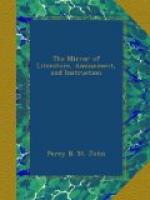of these fields required was performed by himself.
He also assisted his neighbours in haymaking and shearing
their flocks, and in the performance of this latter
service he was eminently dexterous. They, in their
turn, complimented him with the present of a haycock,
or a fleece; less as a recompense for this particular
service than as a general acknowledgment. The
Sabbath was in a strict sense kept holy; the Sunday
evenings being devoted to reading the scripture and
family prayer. The principal festivals appointed
by the church were also duly observed; but through
every other day in the week, through every week in
the year, he was incessantly occupied in works of
hand or mind; not allowing a moment for recreation,
except upon a Sunday afternoon, when he indulged himself
with a newspaper, or sometimes with a magazine.
The frugality and temperance established in his house
were as admirable as the industry. Nothing to
which the name of luxury could be given was there
known; in the latter part of his life, indeed, when
tea had been brought into almost general use, it was
provided for visiters, and for such of his own family
as returned occasionally to his roof, and had been
accustomed to this refreshment elsewhere; but neither
he nor his wife ever partook of it. The raiment
worn by his family was comely and decent, but as simple
as their diet; the homespun materials were made up
into apparel by their own hands. At the time of
the decease of this thrifty pair, their cottage contained
a large store of webs of woollen and linen cloth,
woven from thread of their own spinning. And it
is remarkable that the pew in the chapel in which
the family used to sit, remained a few years ago neatly
lined with woollen cloth, spun by the pastor’s
own hands. It is the only pew in the chapel so
distinguished; and I know of no other instance of
his conformity to the delicate accommodations of modern
times. The fuel of the house, like that of their
neighbours, consisted of peat, procured from the mosses
by their own labour. The lights by which, in the
winter evenings, their work was performed, were of
their own manufacture, such as still continue to be
used in these cottages; they are made of the pith
of rushes dipped in fat. White candles, as tallow
candles are here called, were reserved to honour the
Christmas festivals, and were perhaps produced upon
no other occasions. Once a month, during the proper
season, a sheep was drawn from their small mountain
flock, and killed for the use of the family; and a
cow towards the close of the year, was salted and
dried, for winter provision; the hide was tanned to
furnish them with shoes. By these various resources
this venerable clergyman reared a numerous family;
not only preserving them, as he affectingly says, “from
wanting the necessaries of life,” but affording
them an unstinted education, and the means of raising
themselves in society.”
* * * * *




